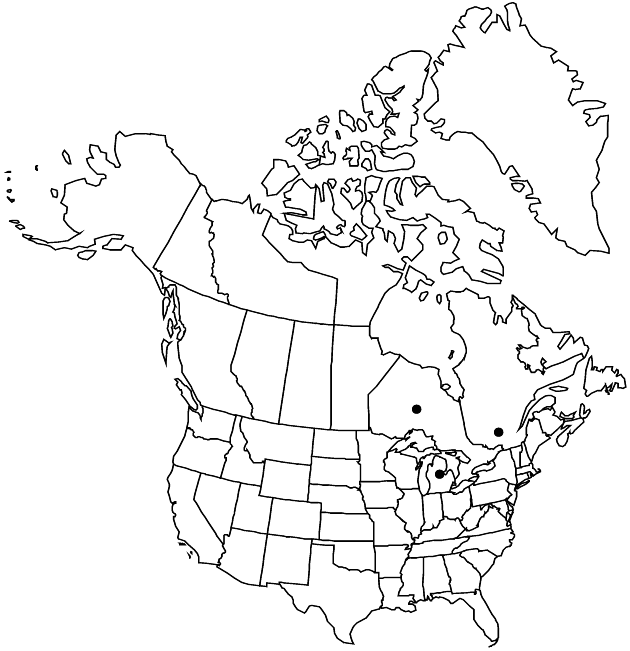Difference between revisions of "Symphyotrichum ontarionis var. glabratum"
Phytologia 82: 138. 1997.
Basionym: Aster ontarionis var. glabratus Semple in J. C. Semple et al., Asters Ontario ed. 2, 60. 1996
FNA>Volume Importer |
FNA>Volume Importer |
||
| Line 10: | Line 10: | ||
|name=Aster ontarionis var. glabratus | |name=Aster ontarionis var. glabratus | ||
|authority=Semple | |authority=Semple | ||
| + | |rank=variety | ||
|publication_title=in J. C. Semple et al., Asters Ontario ed. | |publication_title=in J. C. Semple et al., Asters Ontario ed. | ||
|publication_place=2, 60. 1996 | |publication_place=2, 60. 1996 | ||
| Line 28: | Line 29: | ||
|elevation=10–200 m | |elevation=10–200 m | ||
|distribution=Ont.;Que.;Mich. | |distribution=Ont.;Que.;Mich. | ||
| − | |discussion=<p>Variety glabratum reaches farther north in Ontario and Quebec than does < | + | |discussion=<p>Variety glabratum reaches farther north in Ontario and Quebec than does <i></i>var.<i> ontarionis</i>, as far as the Clay Belt and streams of the James Bay basin. It may be present in Minnesota and Wisconsin. It may be confused with <i>Symphyotrichum tradescantii</i>, which is mostly allopatric. It is distinguished from the latter by its more deeply lobed disc corollas.</p> |
|tables= | |tables= | ||
|references= | |references= | ||
| Line 37: | Line 38: | ||
-->{{#Taxon: | -->{{#Taxon: | ||
name=Symphyotrichum ontarionis var. glabratum | name=Symphyotrichum ontarionis var. glabratum | ||
| − | |||
|authority=(Semple) Brouillet & Bouchard | |authority=(Semple) Brouillet & Bouchard | ||
|rank=variety | |rank=variety | ||
| Line 52: | Line 52: | ||
|publication year=1997 | |publication year=1997 | ||
|special status= | |special status= | ||
| − | |source xml=https://jpend@bitbucket.org/aafc-mbb/fna-data-curation.git/src/ | + | |source xml=https://jpend@bitbucket.org/aafc-mbb/fna-data-curation.git/src/eaa6e58056e40c9ef614d8f47aea294977a1a5e9/coarse_grained_fna_xml/V19-20-21/V20_1154.xml |
|tribe=Asteraceae tribe Astereae | |tribe=Asteraceae tribe Astereae | ||
|genus=Symphyotrichum | |genus=Symphyotrichum | ||
Revision as of 20:24, 16 December 2019
Leaves: abaxial faces glabrous or glabrate. 2n = 32.
Phenology: Flowering Jul–Aug.
Habitat: Alluvial stream shores
Elevation: 10–200 m
Distribution

Ont., Que., Mich.
Discussion
Variety glabratum reaches farther north in Ontario and Quebec than does var. ontarionis, as far as the Clay Belt and streams of the James Bay basin. It may be present in Minnesota and Wisconsin. It may be confused with Symphyotrichum tradescantii, which is mostly allopatric. It is distinguished from the latter by its more deeply lobed disc corollas.
Selected References
None.
Lower Taxa
None.